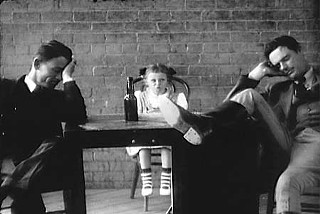Reclaiming Texas History, One Home Movie at a Time
The missionary zeal of the Texas Archive of the Moving Image
By Josh Rosenblatt, Fri., Feb. 27, 2009

Let me set the scene. On a perfectly sunny day in spring, two men square off on a ranch in West Texas. One of the men is tall and strong with broad shoulders covered by a perfectly creased white shirt. His name is Bick Benedict. He looks like America. The other man is smaller, younger, less imposing, yet more frightening for his oil-soaked clothes, his oil-covered face, and his outlandish behavior. His name is Jett Rink. Right there on the bigger man's porch, in front of all the bigger man's friends and the bigger man's wife, Jett taunts Bick with tales of his newfound wealth, which has just sprung miraculously from the ground on his small plot of land. Then he turns to Bick's wife and drawls, "You look pretty enough to eat." That's enough for Bick and his broad shoulders. Blows are exchanged. And after a brief scuffle that leaves Bick with his hair mussed, his pride dinged, and his shirt stained, Jett jumps in his truck and speeds away. Watching him drive off, Bick's drunken uncle weighs in: "Bick, you shoulda shot that fella a long time ago. Now he's too rich to kill."
The scene is from Giant, George Stevens' 1956 epic about wealthy Texas ranchmen fighting off a new breed of wealthy Texas oilmen, Mexicans vying to secure their rightful place in America, the Old World vs. the New, the dignity and tradition of creased shirts and pomaded hair vs. the wild, stained dishevelment of the future. Wide plains, wide screens, big men, beautiful women, racism and rebellion, oil and cattle, and money, money, money, always money. In one 3½-hour package, big as life itself.
I ask you: What could be more Texas than Giant?
Well, how about "Small Boy Runs Dog Circus"? Filmed in a back yard in Dallas and screened as part of a Universal Newsreel in 1935, this 37-second, black-and-white silent movie has no fistfights, no drunkenness, no Dimitri Tiomkin soundtrack (no soundtrack at all), and no Elizabeth Taylor. But it does have a 9-year-old kid in a cowboy costume coaxing a dog across a tightrope while six of his friends look on in sombreros.
So I ask you: What could be more Texas than "Small Boy Runs Dog Circus"?
Down by the railroad tracks on Austin's Eastside, in a small brick building behind a coffee shop, you'll find the office of the Texas Archive of the Moving Image. The day I visited, the office was under siege by dozens of film canisters that had been delivered by the Texas Department of Public Safety that morning; the canisters held films from the Fifties and Sixties trumpeting the importance of bike safety, the ins and outs of hurricane preparedness, and the dangers of drunken driving. Founded in 2002 by film archivist and UT professor (and devoted Sandra Bullock fan) Caroline Frick, TAMI is an organization dedicated to the discovery, preservation, and presentation of these kinds of forgotten curios from Texas' cinematic past. The group's cause is pressing, maybe urgent: With 50% of pre-1950s Hollywood films lost to time and decay and with an even higher percentage of Texas films and videos suffering the same fate, the rush to preserve moving images is no less than an attempt to chronicle eras, customs, traditions, fashions, and lifestyles that are in danger of vanishing from memory.
"Film preservation says a lot about how this country looks at media history," says Frick. "When we talk about film history, most people will think of Casablanca or Giant. Well, those films have been protected by the movie industry, by corporations. What we're trying to advocate for is the idea that that's only one part of film history. Here is all this other kind of information that hasn't been tended to in any way. And only by looking at Casablanca and Giant next to Texas' Department of Public Safety films can we really understand the role of media in society and society itself."
In that spirit of cinematic inclusiveness, this week TAMI is taking over the Alamo Drafthouse and Austin Studios. First, the archive will be presenting three famous Texas-themed movies on three successive nights at the Alamo at the Ritz – Written on the Wind on Monday, The Getaway on Tuesday, and The Legend of Billie Jean on Wednesday – each accompanied by regionally related films from TAMI. "By showing these big Hollywood movies set next to smaller films from the archives," Frick says, "we're trying to celebrate all aspects of Texas media. To keep things interesting, we're tailoring the preshow material to fit those bigger movies. So if you come to watch Helen Slater driving around the Gulf Coast motivating teenagers to rebel against the man in Billie Jean, you'll also see footage we have in our collection from that region" – for example, home movies of a trucking tycoon riding around on a motorboat with a lion that's wearing a hat.
A few days later, on March 7 and 8, TAMI will be launching its new statewide traveling educational program, the Texas Film Round-Up, with screenings of material from its online collection and the debut of the Reel Ride tour, which will allow participants to watch historical films of Austin as they ride around the city in a bus. By which I mean you can watch footage of Congress Avenue circa 1947 while driving around on Congress Avenue circa 2009.
The evenings will also feature TAMI's free digitization program – the centerpiece of the Round-Up. Anyone with Texas-related film or video who is willing to contribute a digital copy to the archive's online library will receive two DVD copies of his or her materials. By doing this, Frick and her colleagues hope to grow the online library and bring the message of Texas film preservation out of the office and the academy and into the consciousness of the people. In May, the Round-Up will head to the Lower Rio Grande Valley, followed by a trip to Lubbock in July.
According to Frick, the goal of the Round-Up is both to preserve cultural artifacts and to challenge commonly held notions about American history, Texas history, and our own pasts. "The real bulk of American media product," she says, "is not what is sitting in Hollywood studios. It's actually things like home movies, like industrial films, like advertising, like local television. We're trying to raise awareness of the value of this kind of material for local, state, regional, and even national and international history. If you really think about our understanding of American film history, we don't know anything about it."
"Our understanding of media history," she continues, "has largely been driven by corporate entities – by the motion picture and television industries. For a hundred years, they've told us what our history is and taught us how to understand ourselves and our culture. But that's not all there is. Looking at local news coverage from 1968, say, or at industrial films or home movies complicates our understanding of 1968. It gives us a totally different impression of that time and allows people to have a say in their own history. The value of this material right now is to challenge people to ask who's been included in creating the history of Texas – meaning, who's been writing it; what are the key events; who was involved?" In other words, the importance of film preservation comes down to power – as in who has it, who uses it, and what they use it for. History is written by those who own the documents.
Then again, the value of these old films may just be a simple matter of personal validation. Searching the TAMI website this past week, it struck me that the subjects of the moving images I found there were probably having a say in the public perception of their lives for the first and only time, that they were at last in charge of the way the world was viewing them, without the blessing of historians or corporate media. They didn't know it at the time, but those spectral figures caught for a minute or two in such classics as "Car Wreck 9-21-62," "Gals Get Rough in Mat Bout," and "Bell Family, 1985 July" were saying to those yet to come: "I was here. This is who I was. And this is where I was from."
See info on the Texas Archive of the Moving Image at www.texasarchive.org. See info on the Wanted: Texas Film series at the Alamo at the Ritz at www.originalalamo.com.












